Greg and Kim Wilson: Young farmers put Oakhampton Dairies on massive growth curve
Meet the southwest Victorian sharefarmers who have built a thriving 1100-cow enterprise from the ground up.
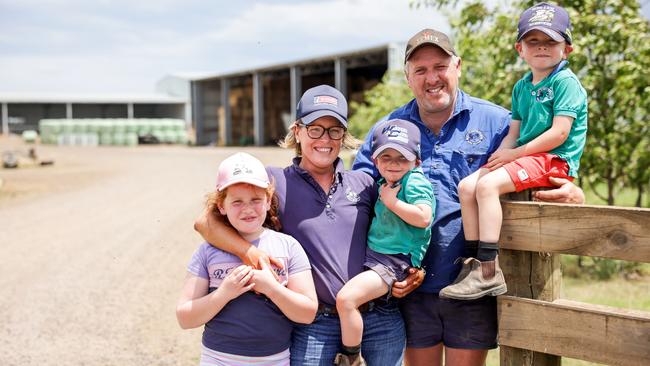
Greg and Kim Wilson rarely do things by halves.
The southwest Victorian sharefarmers have built a thriving dairy operation from the ground up, starting with 700 cows and three staff on a fertile 700ha at Irrewillipe in October 2018.
In five short years, they’ve grown the herd, boosted productivity and profitability, and recruited a cracking team. Their Oakhampton Dairies business now employs 11 full-time workers milking 1100 cows, which graze 1000ha and supply more than 700,000kg of milk solids a year to Coles.
The only place the Wilsons welcome fractional effort is in the business structure, which is a 50:50 partnership with the Richmond family of Rose Grange Pastoral.
“We think sharefarming is a really good path into the industry,” said Greg, 39, who grew up on a dairy farm at Irrewillipe.
“Let’s face it, buying a farm for young people is becoming more and more difficult.
“Sharefarming has been a great way for us to get in and build an asset here with our cattle.”
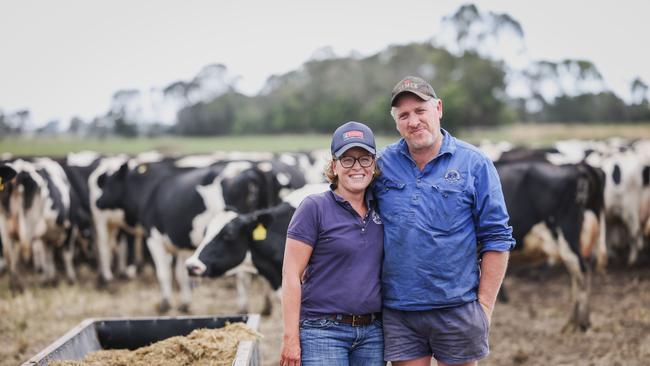
That partnership – with Rose Grange’s Jock Richmond owning the land and the Wilsons owning the cows and business – has been invaluable to Kim and Greg, for the support Jock offers.
“The reason that the partnership works is a really healthy understanding of each person’s role, and trust. The Richmonds have placed an enormous amount of trust in us, they have bought a farm and put us down here to sharefarm it with them and share in the profit.”
Kim added: “And we run it like our own farm.”
Jock said Kim and Greg’s dedication to improvement – of their herd, their milk production and their staff – impressed him and his parents, Neil and Beth, who are partners in Rose Grange Pastoral.
“Greg and Kim are just outstanding; what they’ve brought to the table is fresh ideas and an unbelievable work ethic,” Jock said. “Yes, they have moved production on massively, but it is not only what they are doing themselves, which is a great credit to them, but it is also what they are doing to help other young people achieve and move forward in the industry.
“Not only is it a financially rewarding partnership, it is also a fun partnership … and there’s a lot to be said for that.”
To drive profits for both parties, the Wilsons put 100 per cent effort into everything from growing grass and feeding cows to attention to detail in the dairy.
The couple also pride themselves on recruiting and retaining excellent staff.
“What makes our business good, I think, is the people that we’ve got in it internally, but also the people that we have added externally,” Greg said.
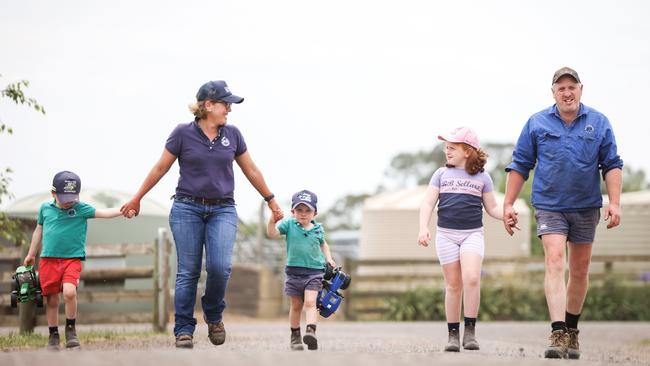
A trusted genetics supplier, artificial insemination technician, animal nutritionist, ag contractor and herd manager have all been integral.
They are most proud, however, of the workplace culture they’ve created.
“The noise in the dairy industry, or any sort of intensive ag industry, is that staff are hard to come by,” Greg said. “But we just haven’t seen that.
“We’re always drawn to finding better people, and keeping them.”
Kim said they made a conscious decision to set high standards for staff.
“If you come to work with a smile on your face and a great attitude, we can teach you anything,” Kim said. “If you don’t you won’t last long here.
“I do a lot of work to try to make sure that we get the right people.”
They strive to create a vibrant, positive atmosphere for their staff, but also to show their children, Ella, 7, Henry, 4, and Lenny, 3, that dairy farming is a rewarding way of life.
STRONG START
The Wilsons’ background in agriculture has served them well.
Greg grew up on his family’s Irrewillipe dairy property while Kim spent her childhood on her family’s mixed enterprise at Finley. They met while studying ag at Dookie. Greg specialised in agronomy and Kim animal nutrition.
Kim went on to work in grain trading and for a stock feed supplier, while Greg ran his family’s dairy until it was sold in 2014. He also worked as a farm hand for cropping and livestock enterprise Rose Grange Pastoral, striking up a solid relationship with Jock Richmond.
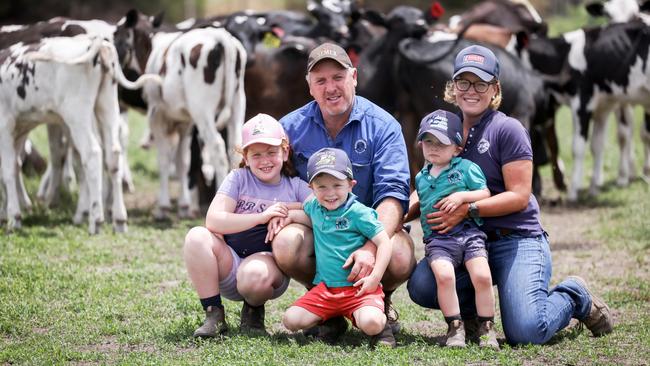
After marrying in 2015, Greg and Kim started a contract spraying business at Echuca. But as drought set in and water availability tightened in 2017, the future looked uncertain.
Greg decided to talk to Jock about their business ambitions.
“I said to him one day, ‘If you know of any opportunity management wise for a young couple then keep us in mind. We’re probably looking for a change’,” Greg said. “I didn’t really know what that meant, at the time, when I said that to him.”
It turns out the conversation was pivotal.
“Jock rang back a short while after and said that they were looking to invest in dairy as part of their enterprise and would we be interested in forming a partnership and going sharefarming with them.
“The dairy industry at the time was probably at rock bottom, it was right after that Murray Goulburn-Fonterra issue. Cows weren’t worth much, milk wasn’t worth that much and we thought it was a good opportunity to get in.”
Greg and Kim worked with Jock to find a 700ha property with reliable rainfall, a 60-unit dairy, good fertiliser history and water infrastructure, where they could successfully develop a large-scale pasture-based dairy business.
“We bought the cows and machinery and we employ the staff. The Richmonds own the farm and we split all the operating costs 50:50,” Greg said.
Soon after they started, a neighbouring property with a 50-unit dairy hit the market, and Jock purchased it to provide a total of 1000ha.
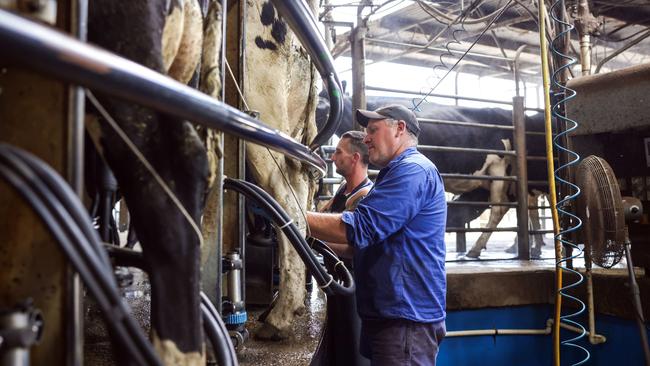
BREED APART
The Wilsons brought in Kim’s brother James Colwell as herd manager and started breeding for improvement, selecting genetics for cow capacity, production and good feet and legs.
“James has got a really keen eye for a good cow. That’s his forte; breeding and animal husbandry and genetics,” Greg said.
“So we set about breeding the cows that we had to be better, and buying in some better-type cows from good herds from all over the country, from Tasmania right through to southern NSW and Victoria.”
Kim said lots of high-quality herds were dispersing at that time, due to falling sentiment in the dairy industry. So they decided to sell the heifers that came with the herd, to purchase better cows and heifers, with their own heifers coming into the herd two years later.
Two employees also came with the property, and the Wilsons quickly learnt they needed more.
Today, six of their 11 full-time staff are locals, while the other half are backpackers – often from Ireland and the UK. Kim started an Instagram page about 18 months ago to show potential employees, especially those from overseas, the realities of working in their enterprise.
“I really wanted to convey that what we were saying was what you would find when you got here,” Kim said.
They’ve also invested in smart team uniforms, events and dinners, and even help with accommodation, vehicles and furnishing houses to make staff welcome. They want their workers to genuinely enjoy benefits from working with them.
Greg said the approach had turned staff management into an enjoyable part of running the business.
“I think the most important thing is that most people are good at something. And to figure that out early, and guide them in that direction,” he said.
The Wilsons lead by doing.
Their everyday presence in the paddocks and the dairy is as much about maximising production and catching any problems early, as it is about camaraderie.
“We feel that milking the cows twice a day is the most important part of our day,” Greg said.
They have two workers at cups on, one at cups off and one droving at every milking.
“Milking is a four-person event every day, twice a day,” he said.
The calf-rearing team works separately, to ensure calves receive as much attention as the milkers.
“We employ people specifically to raise calves,” Kim said. “It’s that consistency that allows them to get really good at their job.”
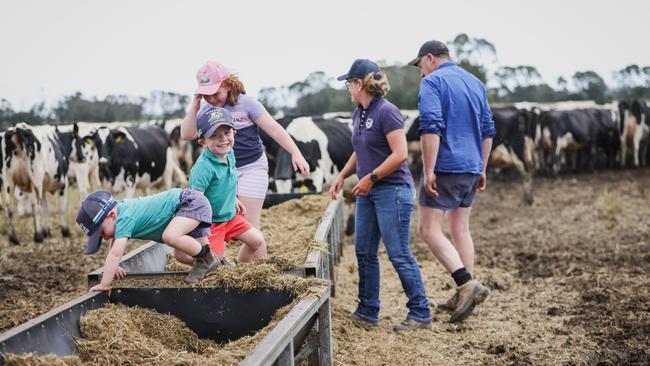
CHANGE APACE
Their original 700-cow herd was seasonal, calving from May 1 to July.
“That’s what we inherited,” Greg said. “It became pretty obvious to me that we didn’t want to calve for big long stints like that.”
So, they moved to a fixed timed AI program with a split calving pattern, with two groups calving in autumn and two in spring.
Their aim was to flatten milk supply, while also managing risk in their system where pasture is available eight to nine months of the year, so they could lock in a three-year contract to supply Coles.
Because they calve in wetter months, they decided a calving shed would be a valuable addition, and Jock agreed, investing in a major build that was completed this year, as well as new hay sheds, calf shed and other capital works including fencing.
The 100-cow barn is an easy walk to the dairy, and has made operations less stressful for animals and workers.
Animal nutrition is also a huge focus.
“Fully feeding our cows is really, really rewarding,” Kim said.
With her nutrition background, Kim makes sure the herd eats a balanced ration year round.
Pasture is the mainstay.
“We grow grass, it’s the cheapest way to make milk and the cheapest way to feed cows,” Greg said. “That is what we try to do first, and foremost.
“Pasture utilisation is a big focus. We don’t get it right all the time, but it is something we’re trying to improve all the time.”
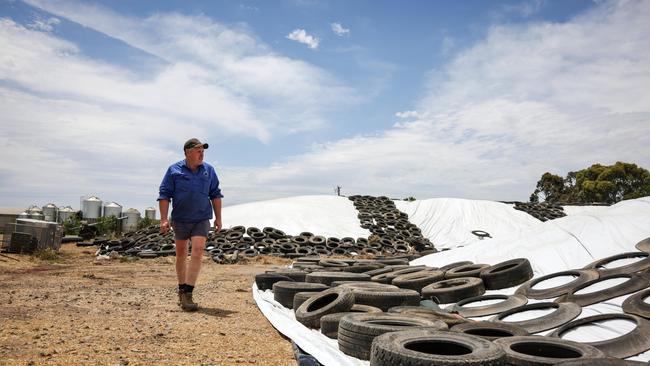
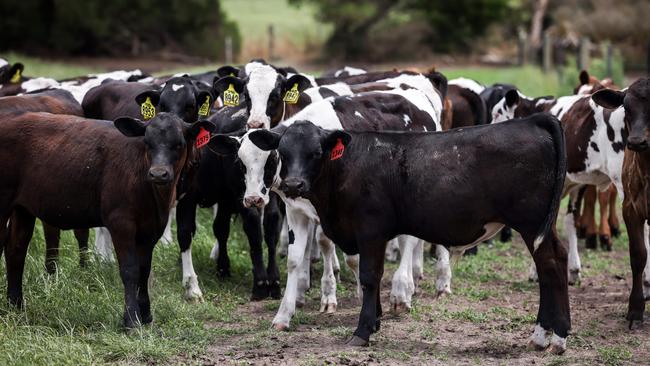
They also make silage, with at least one year’s worth stored on farm in pits and bales, and have added maize as a summer crop to add to the cows’ diet.
“It is a critical part of their ration when they need it,” Greg said.
Reliance on bought-in fodder is declining, but they don’t scrimp when it comes to adding grains and minerals to feed.
They’ve also invested in a mixer wagon to introduce supplementary feeds. This has allowed them to feed fresh cows in a separate herd on a partial mixed ration
“This has been so rewarding to see these cows and heifers perform so well post-calving,” Kim said. “The transition period has been seamless.”
Investment in a really high-quality mineral pellet has also paid off in health benefits.
“It flows on to other really key profit-drivers in the business,” Greg said. “In-calf rates and production. They are the only two that we are scored on from a profitability stand point.”
“The challenge I set myself is producing more solids per hectare” Greg said. Each cow is averaging 650-700kg of milk solids per year.
“And one of the things I’m really proud of is our components.”
The herd averages protein of 3.5 per cent and butterfat of 4.0 per cent all year. And bulk milk cell count – a measure of milk quality and mastitis in the herd – is impressively low at 90,000 cells/ml.
“We think that flows right through to the dairy,” Greg said. “The way we staff the dairy is that people are clean, there is no rush, the cows get milked properly twice a day, and James really underpins all that with management. He culls cows when they need to be culled.”
Greg’s agronomy background comes into play in the paddocks, with about 80 per cent of the farm sown to perennial pastures, while wetter soils are sowed to annuals.
“I think perennial pasture in this area is the best type of pasture,” Greg said.
And there is more growth on the horizon, with the couple planning to expand to 1600 cows and start milking in the second dairy when profit margins dictate.
“We are really passionate about the dairy industry and if we want it to be around when our children grow up, we need to be part of a positive conversation,” Kim said.
“We want to give them every opportunity to be involved if they want to, and show them you can have a really successful business and present yourself in a professional way, have great people around you and a business that you enjoy running.”




